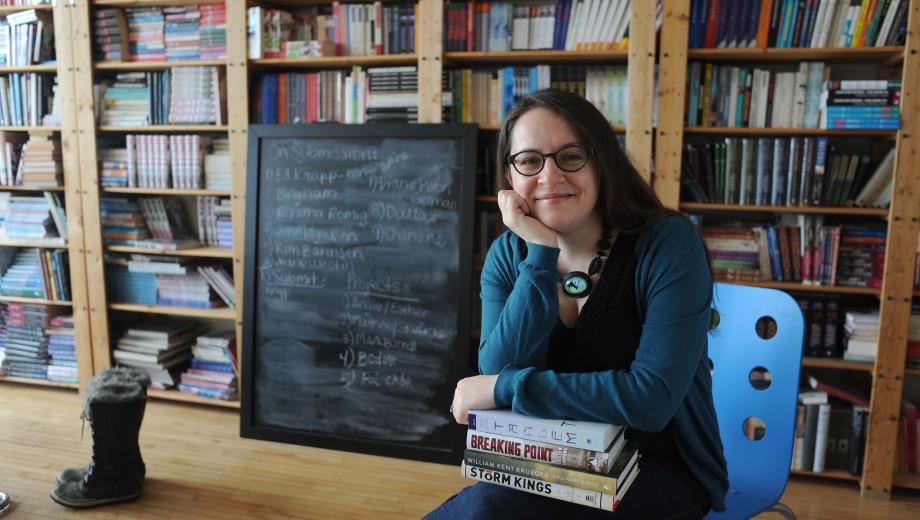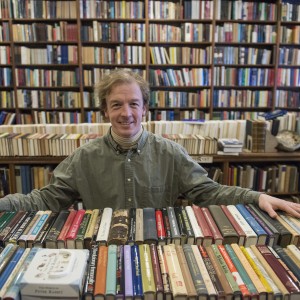Entering a shifting, competitive industry at different moments and with different preparation, few alumni have identical stories about how they broke into book publishing. Ellen Grafton, AM’11, a graduate of the Master of Arts Program in the Humanities (MAPH), began her job search during the recession. “I definitely sent out a lot of résumés and job applications that got no response,” she says.
Before MAPH, Grafton worked as an audiobook narrator and a technical writer; after graduation, she contacted a high school friend at Simon and Schuster who encouraged her to apply for a position there. Now assistant managing editor in the company’s children’s division in New York, she helps “keep track of many moving targets” on projects from toddlers’ board books to teen novels.
When Lindsay Waters, AM’70, PhD’76 (English), finished his doctorate, he took back-to-back, one-year teaching jobs but wished for more stable employment. While at the University of Minnesota he learned about an editorial opening at its press. “It looked, when I first got it, like an admission of total defeat,” he says. “I have failed to get a teaching job,” he remembers thinking, “and now I’m essentially going to be a glorified secretary for faculty members, trying to help them get their books published.”
Thirty-five years later Waters is executive editor for the humanities at Harvard University Press. He acquires manuscripts in philosophy; literary, cultural, and Asian studies; pop culture; “and conflicting relations among peoples in the United States and around the world.” Waters’s 2004 book, Enemies of Promise, laments the decline and commercialization of academic publishing. Yet over a long career he’s explored a vast range of topics and helped bring important ideas to light. “If you want to be an intellectual,” he says, “it’s the best thing to do.”
His UChicago education began that intellectual life. “My graduate training gave me a sense of what were growth areas in the humanities,” Waters says. “I was a PhD student when literary theory was exploding in Europe and not yet big in the United States. There was a big lack on the American publishing scene. I worked in the most concerted way to fill it.”
Grafton, on the other hand, doesn’t use her graduate training every day. “A lot of what I studied specifically in MAPH, contentwise, does not apply at all to my job,” she says. “I did my thesis on spatial representation of duality in The Changeling. I am still very happy that I had a year of the mind, but I don’t apply my knowledge of the minutiae of Renaissance theater to my job.” Even so, she says, “Learning to express your ideas clearly and still retain a level of complexity is important.”
Another New York-based MAPH alum, Allison Wright, AM’08, is the US dictionaries editor at Oxford University Press. She provides editorial support for the New Oxford American Dictionary and is responsible for corrections both in print and online. In 2012 she helped with the publication of the third edition of the Oxford American Writer’s Thesaurus.
Wright got her first glimpse of commercial publishing as an undergraduate linguistics major, when she landed a summer internship writing copy for Scholastic’s grade school math magazines. It was 2005, so she also got a ringside seat when the company launched the sixth Harry Potter book. To learn about the industry, she later took Columbia Journalism School’s six-week summer publishing course.
Tim McGovern, AB’99, AM’01, transitioned from a PhD program in Classics to his current job as an editorial associate at the University of Chicago Press. “A few aspects of publishing track closely with grad school; the biggest is making a quick and accurate evaluation of a work,” he says. “You’re also doing a lot of rewriting, presenting manuscripts to different audiences—fellow editors, the faculty board, the sales and marketing staff.”
After school, the focus expands. “No matter where in publishing you’re working, you’re going to have between five and fifty projects in different stages of activity,” says McGovern. “Being willing to jump into a new field at the deep end is fairly key.” McGovern should know. He studied the ancient Mediterranean world as a graduate student; at the Press, he acquires titles in history, sociology, rhetoric, sex, and jazz.
The intensity of a one-year program such as MAPH—its opportunities and requirements—forces students to become efficient multitaskers, says Joanna MacKenzie, AM’02. MacKenzie is an agent at Browne and Miller Literary Associates, a Chicago agency that represents fiction and nonfiction authors. With her support the company has hired a MAPH intern annually since 2005, including Wright. That preparation has helped many embark on careers in publishing.
MacKenzie urges job hunters to read widely. “Sure, there’s highbrow literary fiction; there’s also Fifty Shades of Grey and everything in between,” she says. “If you are trying to break into publishing you have to be aware of all the different kinds of books being published that are currently successful, because at the end of the day it is a business, and editors are looking for money-making opportunities.”
Internships and summer publishing courses are valuable. So is hands-on experience, from buying used books for a local store to managing content for a website. “Learn about the nuts and bolts of things,” says Waters. Both Wright and McGovern worked part time at the University of Chicago Press while doing course work; McGovern held jobs at two Hyde Park bookstores.
Wright’s job exposed her to the business and manufacturing “of actual, physical books—the paper being used, the costs that are incurred. It’s not just about words on a page and ideas; it’s about chains that operate in order to create products.” “Sure, there’s highbrow literary fiction; there’s also Fifty Shades of Grey and everything in between.”Job seekers should also study the industry online, she says, so potential employers know you’re familiar with the territory. “Any publisher has a press page where they announce major initiatives, like if they’re folding an imprint or merging companies.”
A final tip: be willing to talk to anyone, in any sector, about a job, says Grafton. If you’re shy, “maybe you don’t go to the big networking mixers, but you have coffee, one-on-one, with the friend of a friend. Personal skills are important in almost any part of the publishing business.”
Read more advice from alumni and learn about some of their favorite publishing projects.



Add new comment